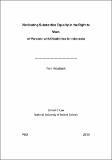| dc.contributor.advisor | Buckley, Lucy-Ann | |
| dc.contributor.advisor | Quinn, Gerard | |
| dc.contributor.author | Rosdianti, Yeni | |
| dc.date.accessioned | 2020-04-23T07:49:01Z | |
| dc.date.available | 2020-04-23T07:49:01Z | |
| dc.date.issued | 2020-10-22 | |
| dc.identifier.uri | http://hdl.handle.net/10379/15903 | |
| dc.description.abstract | This thesis uses a substantive equality framework to analyse disability law and policy on the right to work of persons with disabilities in Indonesia, employing qualitative methods. Substantive equality is essential for the vindication of human rights as it requires positive measures to remove structural barriers. The Convention on the Rights of Persons with Disabilities (CRPD) adopts a human rights model of disability that acknowledges disability as an identity and as part of diversity. The CRPD draws on the substantive equality model to enable persons with disabilities to participate equally in society. As developed by this thesis, and in line with the CRPD, positive measures encompass all necessary measures to achieve substantive equality for persons with disabilities, including ‘specific measures’ and ‘reasonable accommodation’ by both state and non-state actors. The right to work is a fundamental right under the CRPD. It is immensely important for persons with disabilities for dignity as well as economic and social reasons. Following its ratification of the CRPD in 2011, Indonesia adopted The Disability Act 2016 (Act Number 8 of 2016 concerning Persons with Disabilities), which amplifies the human rights model in the disability context, including the right to work. The thesis argues that despite the new focus on the human rights model of disability, there is a lack of awareness in Indonesia which contributes to structural barriers. These include both internal and external barriers. Internal barriers emphasize the personal attitudes and behaviour of persons with disabilities and their families. External barriers are environmental factors which prevent persons with disabilities from fully participating in employment. The research finds that central and local government institutions in Indonesia lack coordination and cohesiveness, leading to gaps and variations in implementation. The research suggests ways in which these problems can be addressed. | en_IE |
| dc.publisher | NUI Galway | |
| dc.rights | Attribution-NonCommercial-NoDerivs 3.0 Ireland | |
| dc.rights.uri | https://creativecommons.org/licenses/by-nc-nd/3.0/ie/ | |
| dc.subject | Disability | en_IE |
| dc.subject | The right to work | en_IE |
| dc.subject | Equality | en_IE |
| dc.subject | Business, Public Policy and Law | en_IE |
| dc.subject | Law | en_IE |
| dc.subject | Disability Law | en_IE |
| dc.title | Vindicating substantive equality in the right to work of persons with disabilities in Indonesia | en_IE |
| dc.type | Thesis | en |
| dc.contributor.funder | Indonesia Endowment Fund for Education, Government of Indonesia | en_IE |
| dc.local.note | The right to work is a fundamental right under the UN Convention on the Rights of Persons with Disabilities (CRPD). Meaningful work is essential for everyone, including persons with disabilities. However, persons with disabilities tend to be marginalised in terms of employment due to stigma and stereotype. This research is focusing on the human rights approach underlying equality. | en_IE |
| dc.local.final | Yes | en_IE |
| nui.item.downloads | 704 | |


